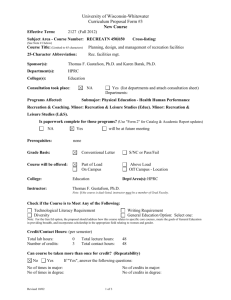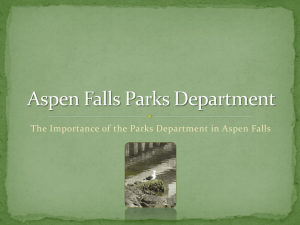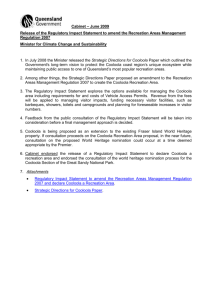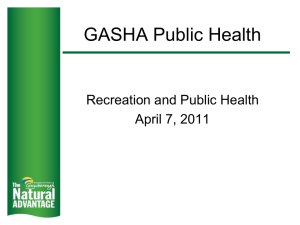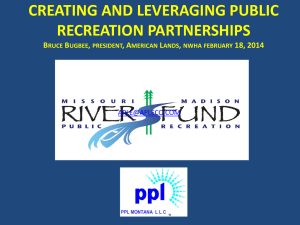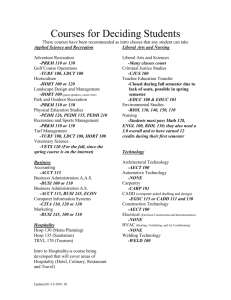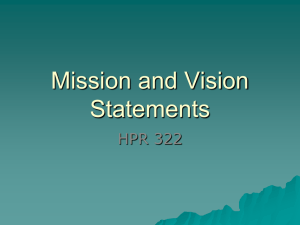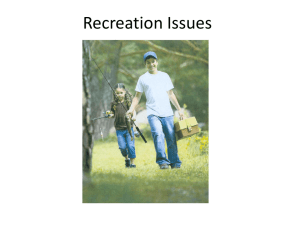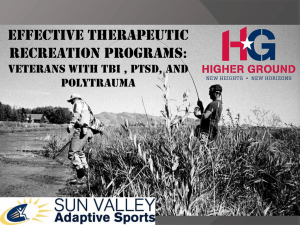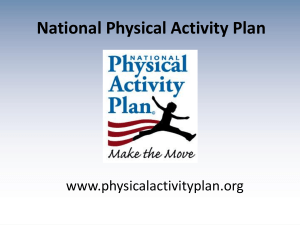_UNDERGRADUATE CURRICULUM - University of Wisconsin
advertisement
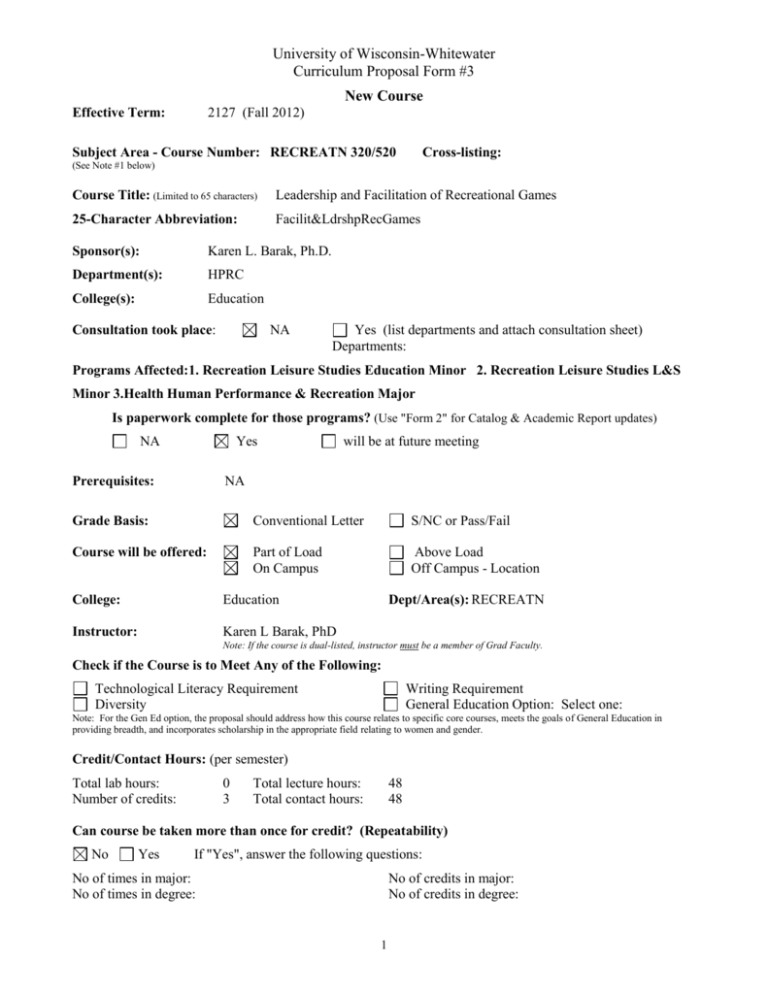
University of Wisconsin-Whitewater Curriculum Proposal Form #3 New Course Effective Term: 2127 (Fall 2012) Subject Area - Course Number: RECREATN 320/520 Cross-listing: (See Note #1 below) Course Title: (Limited to 65 characters) Leadership and Facilitation of Recreational Games 25-Character Abbreviation: Facilit&LdrshpRecGames Sponsor(s): Karen L. Barak, Ph.D. Department(s): HPRC College(s): Education Consultation took place: NA Yes (list departments and attach consultation sheet) Departments: Programs Affected:1. Recreation Leisure Studies Education Minor 2. Recreation Leisure Studies L&S Minor 3.Health Human Performance & Recreation Major Is paperwork complete for those programs? (Use "Form 2" for Catalog & Academic Report updates) NA Yes Prerequisites: will be at future meeting NA Grade Basis: Conventional Letter S/NC or Pass/Fail Course will be offered: Part of Load On Campus Above Load Off Campus - Location College: Education Instructor: Karen L Barak, PhD Dept/Area(s): RECREATN Note: If the course is dual-listed, instructor must be a member of Grad Faculty. Check if the Course is to Meet Any of the Following: Technological Literacy Requirement Diversity Writing Requirement General Education Option: Select one: Note: For the Gen Ed option, the proposal should address how this course relates to specific core courses, meets the goals of General Education in providing breadth, and incorporates scholarship in the appropriate field relating to women and gender. Credit/Contact Hours: (per semester) Total lab hours: Number of credits: 0 3 Total lecture hours: Total contact hours: 48 48 Can course be taken more than once for credit? (Repeatability) No Yes If "Yes", answer the following questions: No of times in major: No of times in degree: No of credits in major: No of credits in degree: 1 Proposal Information: (Procedures for form #3) Course justification: Leadership and facilitation are important skills for professionals in Health, Human Performance, and Recreation to possess. Historically, students learned and practiced these skills in the Recreation Programming and Leadership course. The Recreation Programming and Leadership course content focused not only on leadership, but also on programming (the process of organizing, designing, planning, scheduling, budgeting, marketing, implementing, evaluating etc.) group recreation programs. The course was developed at a time when enrollments averaged 20 students per class. With program growth and raised enrollment caps, the course can no longer meet students’ learning needs in both content areas. Leadership and Facilitation of Recreational Games will split the Leadership content from Recreation Programming and Leadership course, leaving Recreation Programming and Leadership (Title being revised to Recreation Programming) to focus on the aspect of programming. Leadership and Facilitation of Recreational Games has been offered as a Special Studies course over the past two years to meet student needs, which has allowed for adjustments to be made that bring the course to the stage of development appropriate for a regularly scheduled course. Relationship to program assessment objectives: The recreation/leisure studies program has recently obtained additional faculty to increase the program array which has been a long standing objective of the program. Getting new courses from special studies format to traditional curriculum format is an objective for recreation/leisure studies at this time. Budgetary impact: None Course description: (50 word limit) This course will assist students to develop their knowledge, skills, and abilities as facilitators and leaders of recreational activities. Readings, assignments, and lecture will focus on leadership and facilitation theories and techniques. A variety of recreational activities will be introduced in class. If dual listed, list graduate level requirements for the following: 1. Content (e.g., What are additional presentation/project requirements?) Graduate students will be provided information and will gather additional information on several topics to be presented in class and provide this to other students (topics such as communication, group dynamics, problem solving, and decision making). 2. Intensity (e.g., How are the processes and standards of evaluation different for graduates and undergraduates? ) Graduate students will gather additional materials for their course topic, presenting learning material in addition to practice and rehearsal of skills and techniques. 3. Self-Directed (e.g., How are research expectations differ for graduates and undergraduates?) Graduate students will have some flexibility to instruct relevant course topics. Course objectives and tentative course syllabus: RECREATN 496 Recreation Special Studies: Leadership and Facilitation of Recreational Games COURSE SYLLABUS Instructor: Dr. Karen Barak 121 Williams Center Phone (262) 472-3716 office (262) 472-1140 secretary e-mail: Barakk@uww.edu Office hours: Monday: 1:00 – 3:00; Wednesday: 1:00 – 4:00 2 Course objectives: Students will have the ability to: 1. Identify positive leadership techniques for group presentations 2. Identify various games and activities appropriate for groups 3. Lead or facilitate recreational games and activities according to appropriate rules Texts: Michaelis, B. & O'Connell, J.M. (2004). The Game and Play Leader's Handbook: Revised Edition. State College, PA: Venture Publishing. Attendance: If you must be absent from class, you are responsible for arranging with a classmate to "cover" any material to be made up, including picking up your handouts, notes, etc. Four unexcused absences will result in a failing grade. Excused absences must be supported with written material, and include: university sanctioned events with notes from the appropriate faculty member or coach indicating dates; illness with a written confirmation including date of absence from the health center, clinic, hospital, physician, or dentist; funeral in your immediate family; and military service. Unexcused absences include things such as: picking up family members from the airport, going on vacation, attending a friend to a funeral, conferences, oversleeping, car breakdowns, work, sickness without documentation, or court dates for traffic tickets, etc. Three such absences are allowed with minimal consequences so that you can take care of your personal needs. If you arrive late to class it is likely you have been marked absent. Do not interrupt the rest of the class to announce your presence. You should meet with me at the end of class to change your attendance status. Assignments: Late assignments are not accepted. Course requirements and grading Undergraduate Group Presentation of Activity 100 25% instruction Individual Presentation of Activity 50 12.5% Presentation Individual Presentation of Activity 50 12.5% Presentation 12 questionnaires 200 50% 400 100% Graduate Class topic Individual Grading Scale 90 – 100% = A 80 - 89% = B 70 – 79 % = C 60 – 69% = D 0 – 59% =F = 360 - 400 = 320 - 359 = 280 - 319 = 240 - 279 = 0 – 239 Individual 12 questionnaires The University of Wisconsin - Whitewater is dedicated to a safe, supportive and non-discriminatory learning environment. It is the responsibility of all undergraduate and graduate students to familiarize themselves with university policies regarding Special Accommodations, misconduct, Religious Beliefs Accommodation, Discrimination and Absence for University Events. (For details please refer to the Undergraduate and Graduate Timetables; the “Rights and Responsibilities” section of the Undergraduate Bulletin; the Academic Requirements and Policies and the Facilities and Services sections of the Graduate bulletin; and the “Student Academic Disciplinary Procedures” [UWS Chapter 14]; and the “Student Nonacademic Disciplinary Procedures” [UWS Chapter 17]). 3 Course Calendar Course Schedule Week 1 September Course Topic Introduction to Course Why we Play Week 2 September Moving Activities Along Respond to course questions Week 3 September Start up Strategies for Play Respond to course questions Week 4 September Game Resources, Formats/Areas & Choosing Games quest Library &web research Week 5 Sept/Oct Individual Behavior and Motivation Respond to course questions Week 6 October Group Dynamics and Growth Respond to course questions Week 7 October Leadership Styles Respond to course questions Week 8 October Communication Respond to course questions Week 9 October Instruction Respond to course questions Week 10 November Facilitation Respond to course questions Problem Solving Respond to course questions Decision-making Respond to course questions Week 11 November Week 12 November Week 13 November Current Topics Week 14 Nov/Dec Professional Ethic Week 15 December The Big Event Week 16 exam period Respond to course questions The Big Event Continued 4 Bibliography: (Key or essential references only. Normally the bibliography should be no more than one or two pages in length.) Note: Bibliography format is UWW Anderson Library Catalog Style. Barrett, Brian. (2005). Games for the whole child. Champaign, IL : Human Kinetics. Call Number: GV1480 .B26 2005 Bell, Virginia. (2004). The best friends book of Alzheimer's activities : 147 fun, easy, and enriching activities. v. 1 Alzheimer's activities. Call Number: RC523 .B47 2004 Braman, Arlette N. Nidenoff, Michele. (2002). Kids around the world play! the best fun and games from many lands. New York : J. Wiley & Sons. Call Number: GV1203 .B6755 2002eb Bulik, Kenneth J. (2000). Group games & activity leadership. State College, Pa. : Venture Pub. Call Number:GV1203 .B75 2000 Cheatum, Billye Ann. Hammond, Allison A. (2000). Physical activities for improving children's learning and behavior : a guide to sensory motor development. Champaign, IL : Human Kinetics. Call Number: LC4704.5 .C45 2000 Conner, Bobbi. Patacchiola, Amy. (2007). Unplugged play : no batteries, no plugs, pure fun. New York : Workman Pub. Call Number: GV1203 .C584 2007 Dowson, A., Morris, Keith E. J., (2005). Fun and games : 100 sport-related activities for ages 5-16. Champaign, IL : Human Kinetics. Call Number: GV709.2 .D69 2005 Dowson, Anthony. Morris, Keith E. J. (2004). Fun and games : 100 sport-related activities for ages 5-16. Champaign, IL : Human Kinetics. Call Number: GV709.2 .D69 2005 Gaunt, Kyra Danielle. (2006). The games black girls play : learning the ropes from Double-dutch to Hip-hop. New York : New York University Press. Call Number: ML3479 .G38 2006 Gréhaigne, Jean-Francis. Richard, Jean-François. Griffin, Linda L. (2005). Teaching and learning team sports and games. New York : RoutledgeFalmer. Call Number: GV361 .G74 2005 Gréhaigne, Jean-Francis. Richard, Jean-François. Griffin, Linda L. (2005). Teaching and learning team sports and games. New York : RoutledgeFalmer. Call Number: GV361 .G74 2005 Grunfeld, Frederic V. (1975). Games of the world: How to make them, how to play them, how they came to be. New York. Holt, Rinehart and Winston. Hughes, J. D. (2003). No standing around in my gym: Lesson plans, games, and teaching tips for elementary physical education. Champaign, IL : Human Kinetics. Call Number: GV443 .H74 2003 Kasser, Susan L. Lytle, Rebecca K. (2005). Inclusive physical activity : a lifetime of opportunities. Champaign, IL : Human Kinetics. Call Number: GV443 .K36 2005 Kasser, Susan L., Lytle, Rebecca K. (2005). Inclusive physical activity : a lifetime of opportunities. Champaign, IL : Human Kinetics. Call Number: GV443 .K36 2005. Oversized Collection. Knizia, Reiner. Osterhaus, Mark. Winter, Ellen. (2005). Out of the Box Publishing. My word! fast and fun wordplay. Madison, WI : Out of the Box Pub. Call Number: GV1507.W8 M9 2005 Laumann, Silken. (2006). Child's play : rediscovering the joy of play in our families and our communities. [Toronto] : Random House Canada. Call Number: HQ782 .L39 2006 5 Levy, Gavin. (2005). 112 acting games : a comprehensive workbook of theatre games for developing acting skills. Colorado Springs, Colo. : Meriwether Pub. Call Number: PN2061 .L388 2005 Lithgow, John. (2004). A Lithgow palooza! : 101 ways to entertain and inspire your kids. New York : Simon & Schuster. Call Number: GV1203 .L564 2004 Michaelis, B. & O'Connell, J.M. (2000). The Game and Play Leader's Handbook. State College, PA: Venture Publishing. Michaelis, Bill. Holland, Ezra. (2003). Children Together. The best cooperative team building activities for all ages and organizations: Cooperative team building activities. [California] : Bill Michaelis/Children Together. CD-ROM. TPS Acquisition. Miller, Linda G. Gibbs, Mary Jo. Dobbs, Kathy. (2002). Making toys for school-age children : using ordinary stuff for extraordinary play. Beltsville, MD : Gryphon House. Call Number: LB1029.T6 M55 2002 Rohnke, Karl. Butler, Steve. Project Adventure, Inc. (1995). QuickSilver : adventure games, initiative problems, trust activities, and a guide to effective leadership.Dubuque, Iowa : Kendall/Hunt Pub. Co. Call Number: GV362 .R567 1995 Rosengard, Paul F. Sallis, James F. (2000). SPARK : sports, play & active recreation for kids! : active recreation : ages 5-14. San Diego, CA : SPARK, San Diego State University. Call Number: GV182.9 .S73 2000 Soares, Joe. Zupan, Mark. Thinkfilm. MTV Films. EAT Films, LLC. A&E IndieFilms. (2005). Murderball [S.l.] : Distributed by ThinkFilm, c2005. Videorecording Call Number: GV709.3 .M8 2005 Singer, Dorothy G. Singer, Jerome L. (2001). Make-believe : games and activities for imaginative play : a book for parents, teachers, and the young children in their lives. Washington, DC : Magination Press. Call Number: LB1137 .S559 2001 Stetson, Emily. Congdon, Vicky. (2001). Little Hands fingerplays & action songs : seasonal activities & creative play for 2- to 6-year-olds. Charlotte, Vt. : Williamson Pub. Call Number: 793.4 Ste Sugar, Steve. Sugar, Kim Kostoroski. (2002). Primary games experiential learning activities for teaching children K-8. San Francisco, CA : Jossey-Bass. Call Number: LB1029.G3 S92 2002eb Sullivan, Patricia A. & ERIC Clearinghouse on Teaching and Teacher Education. (2003). Team sports, gymnastics, and dance in community settings : a guide for teachers, coaches, and parents. Champaign, IL : Human Kinetics. Call Number: GV365 .T46 2003 Wetzel, Kathryn C. Harmeyer, Kathleen M. (2000). Mind games the aging brain and how to keep it healthy. Albany, NY : Delmar. Call Number: BF724.55.C63 W48 2000eb Wilkins, Julia. (2001). Group activities to include students with special needs : developing social interactive skills. Thousand Oaks, Calif. : Corwin Press. Call Number: LC4026 .W54 2001 Yao, Daozhong. McGinnis, Scott. (2002). Let's play games in Chinese. Boston : Cheng & Tsui. Call Number: PL1111 .Y36 2002 Notes: 1. Contact the Registrar's Office (x1570) for available course numbers. See Subject Areas listing. 2. The 15 and 25 character abbreviations may be edited for consistency and clarity. 3. Please submit electronically when approved at the college level - signature sheet to follow in hard copy. 6
